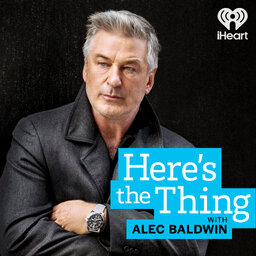Rufus Wainwright Sings with the Muses
Singer, songwriter, and composer Rufus Wainwright continues to surprise and delight with a new tour and album, Rufus Does Judy at Capitol Studios, paying homage to one of his heroes, Judy Garland, and her historic recording. Wainwright was practically born into songwriting as son of musicians Loudon Wainwright III and Kate McGarrigle, and touring with his family by the age of thirteen. The Juno-Award winning and Grammy-nominated artist has since defied expectations, playing with genre, from standards to pop and even opera. Rufus Wainwright talks to host Talia Schlanger about the influence of his musical family, what uncharted territory is next for him and how he communicates with the muses in his songwriting.
 Here's The Thing with Alec Baldwin
Here's The Thing with Alec Baldwin


